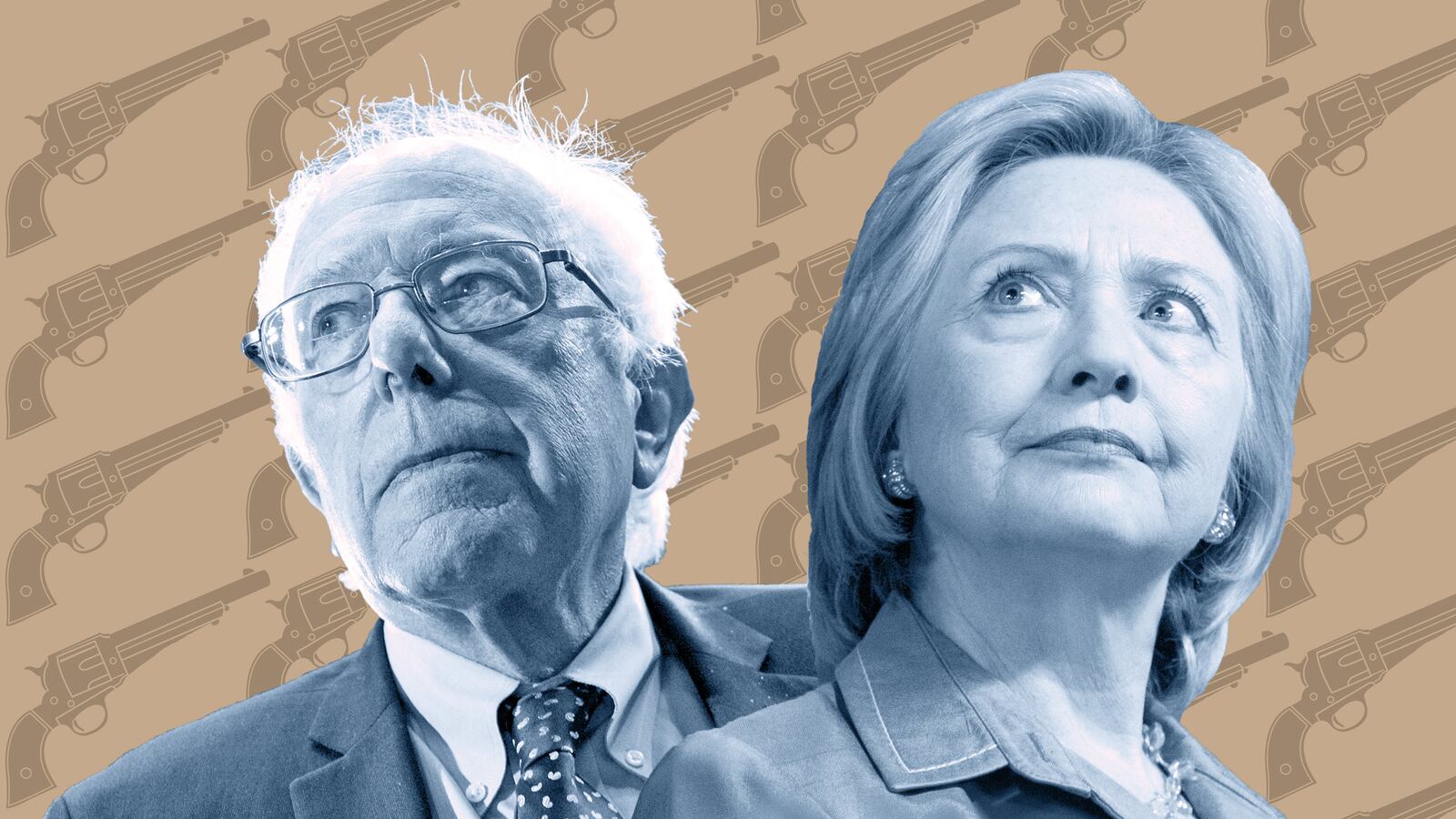The Brady Campaign to Prevent Gun Violence, the gold standard in a growing coalition of anti-gun groups, is leading the way in applauding Hillary Clinton for making the gun issue a cornerstone of her campaign. And they’re upset with Bernie Sanders for a vote he cast 10 years ago that gave the gun industry immunity from lawsuits—legislation that had been on the NRA wish list for years before Congress passed it and President Bush signed it into law in 2005.
The law that is now at the center of the first direct conflict between Clinton and Sanders is the Protection of Lawful Commerce in Arms Act (PLCAA). Asked to describe what it does, Dan Gross, president of the Brady Campaign, told The Daily Beast, “The word I use is evil. It affords the gun industry protection that no other industry in America has—immunity from liability for the product they make, a product that kills 30,000 people a year. You have to question the motive of anyone who would support a law that provides complete immunity only to the gun industry.”
Sanders has recently defended that vote, telling CNN in an interview in May that if a hammer were used to bludgeon someone to death, you wouldn’t sue the company that made the hammer. Gross disagrees.
“If the hammer were made or sold in a negligent way, you could sue, and with guns you can’t. It’s a flawed analogy.”
In a phone call with reporters, asked if he felt “uneasy” about Sanders’s commitment to gun safety because of this one vote, Gross said, “What makes me uneasy…it’s his lack of appreciation for the dangers associated with PLCAA.” Clinton voted against the PLCAA when she was in the Senate, so there is a clear difference in their voting records, giving Clinton a rare upper hand on an issue important to progressives.
The Brady Campaign’s obvious delight in the proposals Clinton outlined to curb gun violence if she becomes president stopped just short of an outright endorsement.
“It’s a question of balance and tone,” says Gross, pointing out that four or eight years ago no candidate took on the gun industry like Clinton did at a town hall meeting in New Hampshire on Monday. She called for expanded background checks and tighter gun laws to cover Internet sales. She promised more executive action and said she would work to repeal the PLCAA.
“Nobody has come out until today to make this a major cornerstone in a campaign in decades,” Gross says.
A robust campaign to rein in guns has long been considered a political loser against the all-powerful gun lobby. But with Clinton struggling to match Sanders’s grassroots appeal, the renewed attention to the gun issue in the wake of the shooting in Oregon is proving a welcome chance for Clinton, the establishment candidate, to make inroads with progressives that are so enamored of Sanders.
Tad Devine, chief strategist for the Sanders campaign, claims there is a lot of “mythology” about Sanders and guns. It’s true that he voted against the original Brady Bill when he was in the House, but it’s not true, says Devine, that the gun lobby got him elected in 1990.
And the truth is, Sanders’s record is complicated. When he first ran for Congress in 1988, Sanders supported the assault weapons ban. His Republican opponent in the that race for Vermont’s one House seat, Peter Plympton Smith, opposed it, but then voted for it after he got elected. The NRA was furious, and Sanders was the beneficiary of the gun lobby’s wrath, defeating Smith after one term.
The Sanders campaign is bracing for more incoming fire on guns, particularly for his 2009 vote to bring guns on Amtrak just like you can on planes in checked luggage. Then again, he’s also cast enough votes that the gun lobby doesn’t like, such as for closing the gun show loophole and limiting the size of cartridges, that he now gets a “D-“ minus rating from the NRA. Meanwhile, Howard Dean, who was a favorite of the left in 2004, received multiple “A” ratings from the NRA when he was governor of Vermont.
Vermont has zero gun control and lots of hunters, and the Democratic wing of the Democratic Party didn’t make a fuss over Howard Dean’s gun record. “Let New York and New Jersey and California have all the gun control they want,” Dean used to say while campaigning for the presidency in 2004. “But don’t impose it on Montana or Vermont or Iowa, where we don’t need it.”
That’s the kind of sentiment that gives Sanders’s backers faith that they can survive Hillary’s looming gun control onslaught.
“I don’t think [gun control] is going to get us off track,” says Devine. “He’s not A-rated like Howard Dean. We’ll have some back and forth, but I’m sure we’ll survive.”






